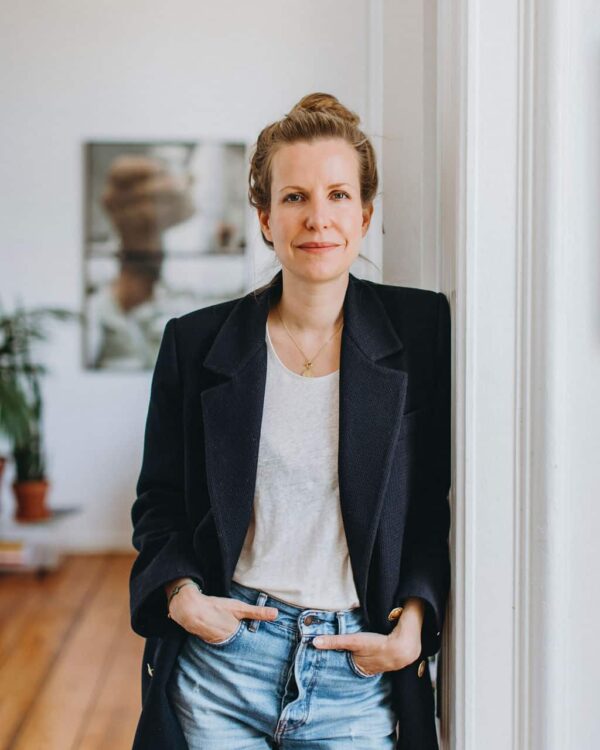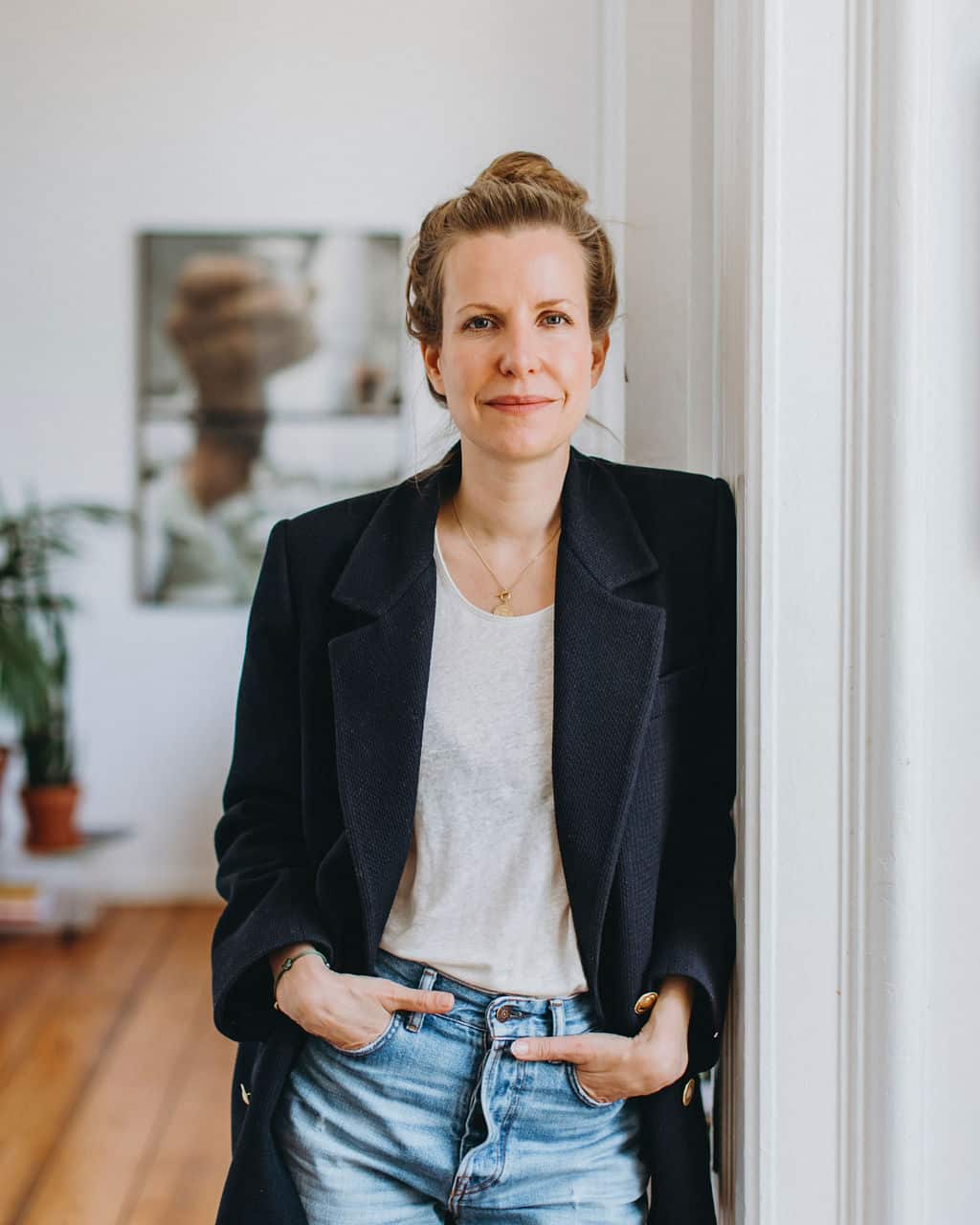Interview with Louisa Scheel, Systemic Coach
“Living and working with inner peace & balance” — this is the first sentence that invites you to Louisa Scheel’s website. The site is clear and tidy — and it conveys what Louisa’s work stands for: silence and understanding. Louisa Scheel is a systemic coach and couples therapist and has turned to Zen Buddhism. In an interview that is well worth reading, she told us how she defines the meaning of life and how we can still remain stable inside during challenging times, for example when we have the desire to have children or even during the journey to have children.
Louisa, you have gone through many different, interesting stages in your life so far. Please describe your personal path from your job as founder of a content marketing agency to Zen Buddhism.
I had my first professional experience in the media industry after studying business in Singapore and London. That was exciting. A few years later, I was drawn back to my hometown Berlin and founded a content marketing agency. My passion is storytelling. Content marketing is storytelling for brands. The role of entrepreneur excited me, but it was also very demanding and brought me to my knees after two and a half years. I was just totally exhausted. Zen meditation crossed my path and I felt a deep longing for calm and inner peace. I followed my heart and went to the monastery in Allgäu for a week to learn the basics of Zen practice in silence from the Zen master. Since then I sit every morning for 25 minutes in power and silence and look at how I am inside and this lets powerfully choose my own path.
Two years ago my life took a big turn. The agency was sold to an international agency group and I followed my heart’s path. A work that focuses on the development of the human being. I continued my education as a couples therapist and systemic coach.
You also work with couples and write on your website that couples therapy is often only accepted when the relationship seems to be at an end. What is your experience here, why is that?
On average, it takes seven years before a couple decides to go to couples therapy. Couples often think they can solve the issues on their own and it is still widespread in people’s minds that whoever gets help is not strong or clever enough. This is, of course, nonsense. What couples therapy needs is a little bit of courage. All of a sudden you hear your partner saying what you might not want to hear and that takes courage to face it and grow together.
What I also hear more often is that couples are worried that couples therapy could lead to a break-up. Of course, a separation can be a solution to the problem. However, couples therapy serves first and foremost to bring couples back into conversation with each other and to create acceptance for the partner’s differences. Letting the other person “be like that”. By the way, the term couple coaching is much better received by younger people. What is the difference? Coaching is meant to help lead to a stable and happy relationship, whereas therapy helps to overcome crises and resolve emotional injuries.
What do you think it means to be happy and live a fulfilled life?

I have been dealing with the concept of happiness since my youth. Only over the last few years have I understood for myself what it means to lead a happy and fulfilled life: To recognise the uniqueness of every moment and every encounter and to give them my full attention.
I help my individual clients in the sessions to work out what is important to them: “What has value in my life?” And then always the big question, “HOW do I want to live?”
Life is not beautiful or bad. Life is life and I choose life with all that it brings. Then I can only grow in life and not despair. Many people’s dissatisfaction comes from a reality that is not as they imagined.
“Change happens when you become what you are. Change does not happen when I want to become what I want to be.”
Many couples wish for a child, which often puts a huge strain on the relationship. Starting a family is an ideal, which — if it doesn’t work out — can therefore make people very unhappy. Because often there is a long path of suffering associated with it. What is your opinion on the topic: Is a child necessary to be happy?
You are right, the path of suffering is often long and difficult and always very individual.
The archetype of the family is very strong in the collective subconscious. According to the psychologist Carl Jung, archetypes are primal images that have been linked to similar emotions and associations for generations. Having children means belonging and consequently: not being different. We all unconsciously seek to belong. In recent years, more and more movements have emerged that have taken a critical look at having children, such as “Regretting Motherhood”. I also know many women who don’t have such a strong desire to have children, but who feel totally socially obliged to have a child. Here, too, I support their individual path in individual coaching sessions to clarify this big life question for themselves.
When starting fertility treatment, most people enter unknown territory. Medicine takes over and this time can be quite emotionally challenging. In your opinion, how do you manage to stay in tune with yourself during such treatment? In other words, to rest within oneself even when it gets stormy outside?
In modern society, people always want orientation, a clear path and a goal very quickly. Unfortunately, when it comes to having children, we don’t get any immediate orientation. Neither on the outside, nor on the inside. It takes trust to go this way. Trust in life itself. In ourselves. Self-love and acceptance are the key to dealing with ourselves well in uncertain times. Zen meditation, as a silent meditation, helps to find one’s own centre, strength and trust. By stopping. By being still. Zen brings us to ourselves.
As a couple therapist, I accompany couples and women through the treatment phases and stand by their side with support.
What advice do you have for people with an unfulfilled desire to have children? What can they learn about themselves in a Zen meditation?
Women in this situation often feel increasingly lonely and tend to withdraw more and more.
My advice is to break through the growing isolation and to stay in conversation with your partner as well as to exchange ideas with other women in the same situation. If the desire to have a child becomes so dominant that it determines your whole life and the desperate feeling arises that without a child there is no point to anything, then it can be very helpful to deal with the following questions with your partner or alone: “Why do I/we actually want a child? “What does a child mean for my/our self-confidence?” “How did each of us experience our own family?” and “What could our life be like without children?”
Zen meditation can help to get clarity about these questions and to look deeply within. Without the noise from outside. Completely with ourselves.
When we endure this unknown space on the meditation mat opposite us, a new path opens up that we can walk powerfully and with joy. A life-affirming path. Even if life is sometimes challenging.
Often women who can’t get pregnant so easily also struggle with their own bodies. What can you give them?
Be loving with yourself, even if it sometimes seems difficult. Self-care rituals give support. Expressing gratitude for what we have is a wonderful way to focus our brain on the positive rather than the lack. My advice is to give thanks for what I have before going to bed. This helps us to develop a life-affirming attitude — even in difficult times.
Viktor Frankl said: “If life has any meaning at all, suffering must also have a meaning. What matters is not what one suffers, but how one takes it on.”
Louisa is a systemic coach and couples therapist in Berlin. She works with couples as well as individuals. She is the founder of Love Lab: Love Lab offers workshops, retreats and coaching on a wide range of topics around building and maintaining happy relationships with ourselves and others. More at: scheel-paartherapie.de
About Fertilly
At Fertilly, we have made it our mission to accompany couples (homosexual and heterosexual) and singles on the way to fulfilling their child wish. In doing so, it is important to us to create transparency in the area of fertility services, to provide information and knowledge on the topics of pregnancy and fertility and to help you to find the most suitable Fertility Center. Through cooperation with first-class Fertility Centres and clinics in Europe, enquiries about Fertilly are given preferential treatment. This means that our patients avoid the usually long waiting times and get appointments more quickly.
If you would like more information about Fertility Centers, success rates and prices, please contact us using this questionnaire. We will advise you free of charge and without any obligation.
-
Answer the first questions in the online form in order to book an appointment. This way we can better address your needs during the conversation.
-
We will find the best contact person for your individual needs. Schedule 20 minutes for the consultation.
-
We will introduce you to the right fertility clinic from our network, make an appointment and accompany you until your wish for a child is fulfilled.
